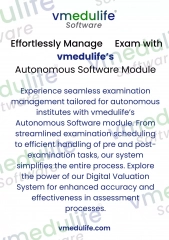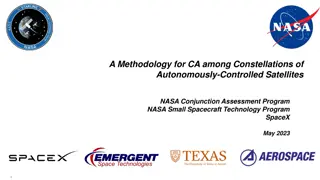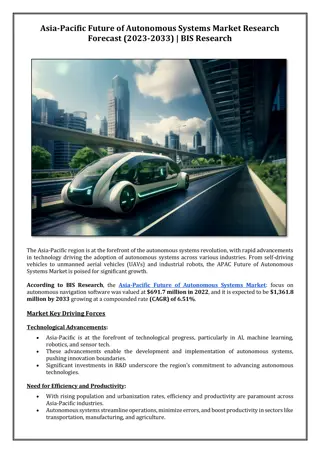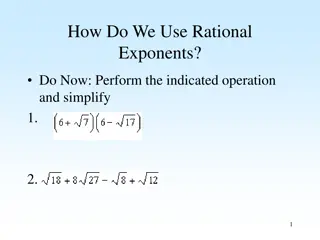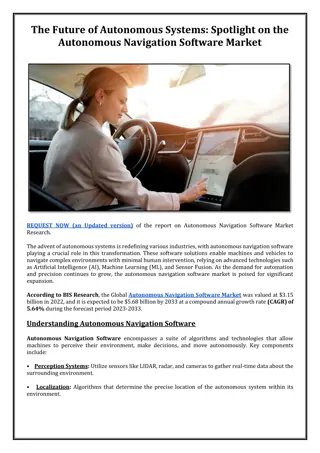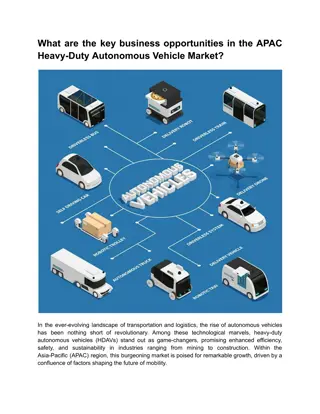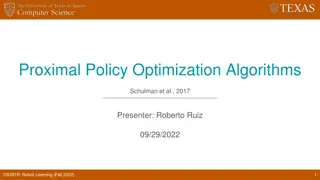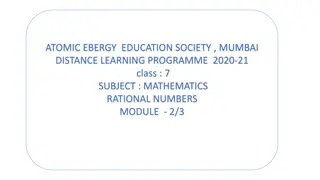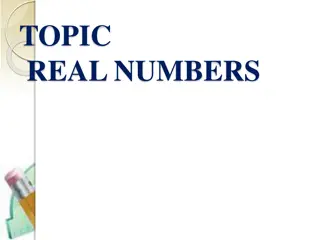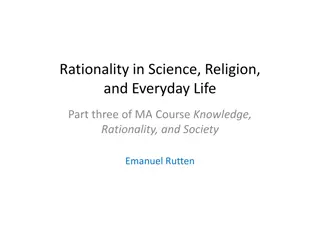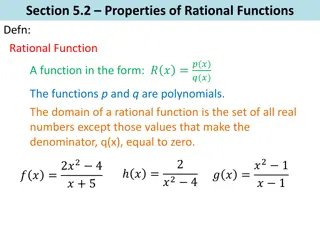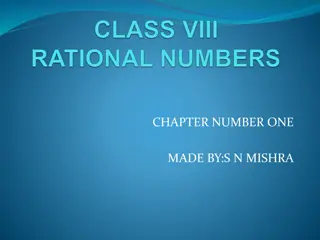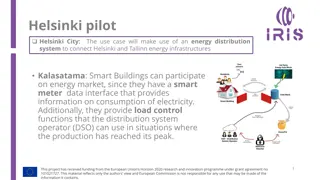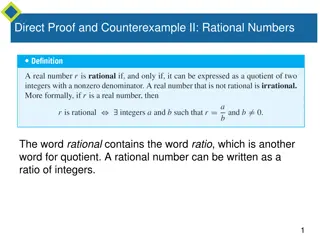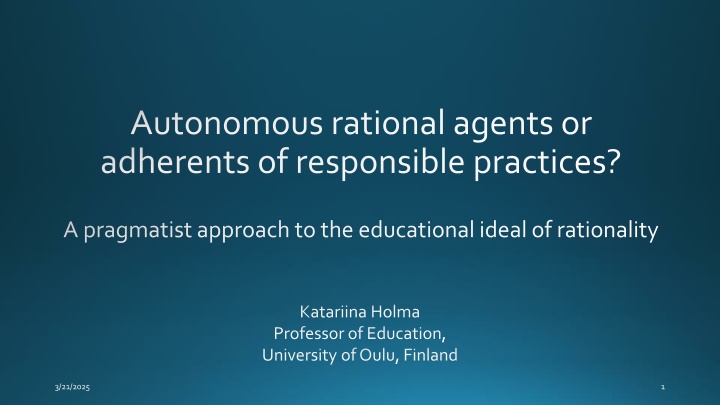
Responsible Social Practices in Education
Explore the significance of responsible social practices over rational autonomy in education, emphasizing the growth into a democratic community. Discover why detaching moral reasoning from these practices can endanger personal and social lives, hindering moral education. Join the discourse on reinterpreting the concept of rational autonomy through membership in responsible social practices for sustainable democracies.
Download Presentation

Please find below an Image/Link to download the presentation.
The content on the website is provided AS IS for your information and personal use only. It may not be sold, licensed, or shared on other websites without obtaining consent from the author. If you encounter any issues during the download, it is possible that the publisher has removed the file from their server.
You are allowed to download the files provided on this website for personal or commercial use, subject to the condition that they are used lawfully. All files are the property of their respective owners.
The content on the website is provided AS IS for your information and personal use only. It may not be sold, licensed, or shared on other websites without obtaining consent from the author.
E N D
Presentation Transcript
Autonomous rational agentsor adherentsof responsible practices? A pragmatist approach to the educational ideal of rationality Katariina Holma Professorof Education, University of Oulu, Finland 3/21/2025 1
How one grows into a responsible membership of a democratic community? If we want to sustain and develop our democracies, the aim of initiation into responsible social practices should take priority over the aim of rational autonomy. 3/21/2025 2
Whats the problemwith rational autonomy? The problem is NOT rationality as oneimportant means of aqcuiring adequate information about the world(related, for example, to the educational aim of critical thinking) autonomy as referring to a morally responsible subject as an aim of education 3/21/2025 3
Whats the problemwith rational autonomy? BUT A philosophical view that places rational autonomy as a main educational aim if it is Based on a flawed view of rationality Based on a flawed view of the nature and development of human morality Based on a flawed view of the relationship between educational ideals and empirical reality 3/21/2025 4
Whats the problemwith rational autonomy? THUS It is not necessary to entirely give up with the concept of rational autonomy (although I might prefer, for example, the concept of moral responsibility) BUT The concept should be interpreted correctly The growth into rational autonomy is possible only through membership of responsible social practices 3/21/2025 5
Why thetopicis important? If we unstick moral reasoning and moral virtues from the very practices in which they are necessarily embedded, we put our personal and social lives in peril. The moral life is essentially a matter of socially developed and socially conducted practices. If we insist on seeing moral reason and moral virtues as simply personal achievements that alone or together are adequate to the independent autonomous creation of individual moral lives, we will inevitably see the failure of our aspirations for ourselves and our society. I think it is precisely this detachment of reason and virtue from the specific complex realities of the social practices of daily life that has disastrously undermined our approaches to moral education and sapped them of their force. (Paul H. Hirst 1999 b, pp. 103 104) 3/21/2025 6
Autonomous rational agents or adherents of responsible practices? The structure of the presentation Pragmatist approach to the notion of rationality Rationality as partof nature One rationality in allpractices Rationality as intertwined with emotions Rationality as fallible (the danger of rationalization and self-deception) Rationality as fundamentally social Theempiricallyadequateviewof moraldevelopment Ideals and realityin thephilosophyof education Conclusion: If we want to sustain and develop our democracies, the aim of initiation into social practices should take priority over the aim of rational autonomy. 3/21/2025 7
1.Pragmatist approach to the notion of rationality Rationality as partof nature Starting point of the early pragmatists: How the theory of knowledge should be revised based on evolutionary theory? Human knowledgeformationhasbeen developedin interactionwithmaterial and socialcontext Overallfallibilism: no possiblity of certaintyeitherbyreasonor perception -Rationality as part of nature -One rationality -Rationality as intertwined with emotions -Rationality as fallible -Rationality as fundamentally social 2.The empirically adequate view of moral development 3.Ideals and reality in the philosophy of education 3/21/2025 8
1.Pragmatist approach to the notion of rationality One rationality -Rationality as part of nature -One rationality -Rationality as intertwined with emotions -Rationality as fallible -Rationality as fundamentally social In all practices and fields of human understanding: including ethics and morality As contrasted to rationality as possible only in science but not in ethics (e.g. Harman 2001) Several, field-independent notions of rationality (e.g. Hirst 1999b) 2.The empirically adequate view of moral development 3.Ideals and reality in the philosophy of education 3/21/2025 9
1.Pragmatist approach to the notion of rationality Rationality in ethics Harman s denial(Holma 2011) Harman s (2001) moral relativism: - our ordinary factual beliefs provide us with evidence that there is an independent world of objects because our having those beliefs cannot be plausibly explained without assuming we interact with an independent world of objects external to ourselves, while our moral beliefs do not provide us with evidence for such an independent realm. Therefore, for Harman: -ethics does not belong the realm of rationality since ethical reasons are not congenial to science. -Rationality as part of nature -One rationality -Rationality as intertwined with emotions -Rationality as fallible -Rationality as fundamentally social 2.The empirically adequate view of moral development 3.Ideals and reality in the philosophy of education 3/21/2025 10
Rationality in ethics is possible (Holma 2011, 2023) 1.Pragmatist approach to the notion of rationality -Rationality as part of nature -One rationality -Rationality as intertwined with emotions -Rationality as fallible -Rationality as fundamentally social In both fields We participate in inquiry and argumentation in order to make our conceptions (contrasted to matters of taste) We cannot question all our assumptions and conceptual schemes and start from the basis of certainty (Peirce 1934 ab) Also in science, the role of emotions as well as of moral concerns and values , is central (Scheffler 1991, Holma 2015) in our everyday lives, we navigate between facts and values, and our knowledge from the two fields is the best we can achieve any given moment We don t need a reference to the ontological reality in either of these fields 2.The empirically adequate view of moral development 3.Ideals and reality in the philosophy of education 3/21/2025 11
One rationality in science and ethics Hirst sdenial 1.Pragmatist approach to the notion of rationality -Rationality as part of nature -One rationality -Rationality as intertwined with emotions -Rationality as fallible -Rationality as fundamentally social I had totally failed to appreciate the importance of Aristotle s distinction between theoretical and practical reason. Reformulating that distinction in contemporary terms I came to see a crucial difference in these two exercises of our rational capacities. The exercise of reason in a theoretical sense results in our achieving bodies of propositions about whose truth we can agree and which thereby satisfy our natural intellectual desires for knowledge and understanding. But we are capable also of the exercise of reason in achieving actions and practices which we can agree constitute our moral and social good in their satisfying our practical, material, and emotional needs and desires. (Hirst 2008, 119-120) 2.The empirically adequate view of moral development 3.Ideals and reality in the philosophy of education 3/21/2025 12
One (not two) rationalityin science and ethics(Holma 2023) 1.Pragmatist approach to the notion of rationality -Rationality as part of nature -One rationality -Rationality as intertwined with emotions -Rationality as fallible -Rationality as fundamentally social theory is embedded in all our practices in a way that neither theory nor practice is more fundamental than the other even the prime concerns of theoretical reason, namely consistency and coherence, are themselves simply matters of practical rationality . (w)hat is wrong with theoretical incoherence is thus ultimately something pragmatic its frustration of the cardinal aim of the practical enterprise of inquiry of securing sensible answers to our questions (Rescher 2004, p. 57) 2.The empirically adequate view of moral development 3.Ideals and reality in the philosophy of education 3/21/2025 13
1.Pragmatist approach to the notion of rationality Rationality and emotions -Rationality as part of nature -One rationality -Rationality as intertwined with emotions -Rationality as fallible -Rationality as fundamentally social Reason and emotion working together Bothfallible Possibleto becorrectedt in processesof sharedinquiry Reflectiveequilibrium (Elgin 2016) 2.The empirically adequate view of moral development 3.Ideals and reality in the philosophy of education 3/21/2025 14
1.Pragmatist approach to the notion of rationality Rationality as fallible -Rationality as part of nature -One rationality -Rationality as intertwined with emotions -Rationality as fallible -Rationality as fundamentally social Our processes of belief formation arenot transparent to ourselves The danger of self-deception and rationalization (Holma 2012) 2.The empirically adequate view of moral development 3.Ideals and reality in the philosophy of education 3/21/2025 15
1.Pragmatist approach to the notion of rationality Rationality as fundamentally social -Rationality as part of nature -One rationality -Rationality as intertwined with emotions -Rationality as fallible -Rationality as fundamentally social Rationality as developedand learned in interaction withmaterial and social reality Rationality as fallible thecorrection of our processesof thinking and belief formation depends heavilyon others (e.g. the self-correcting method of science) 2.The empirically adequate view of moral development 3.Ideals and reality in the philosophy of education 3/21/2025 16
Empirically adequate viewof the development of human morality - wherewemight bemistaken? (Huhtala&Holma2019) 1.Pragmatist approach to the notion of rationality -Rationality as part of nature -One rationality -Rationality as intertwined with emotions -Rationality as fallible -Rationality as fundamentally social One version of a mainstream misguided view: Habermas s theoryof communicative action Relies heavilyon empirical theories of Piaget (geneticstructuralism) and Kohlberg (moral development) (Habermas 1976, 1983, Bookman 2002) Piaget s and Kohlberg s theries are false, based extensive contemporary empirical evidence (Bechara et al., 1994, 1997; Cohen, 2005; Damasio, 1994, 1996; Greene & Baron, 2001; Greene et al., 2008; Haidt 2012, Hauser 2006, Hogarth, 2001; Kahneman, 2003; Kahneman & Frederick, 2002; Kahneman & Sunstein, 2005; Koenings et al., 2007; Moll et al., 2002; Olatunji et al., 2017; Qiao-Tasseritet al., 2017; Rudertet al., 2017; Slovicet al., 2004) 3/21/2025 2.The empirically adequate view of moral development 3.Ideals and reality in the philosophy of education ) 17
1.Pragmatist approach to the notion of rationality Empirically adequate viewof the development of human morality Stems withpragmatistphilosophy: non-transparencyof our thinking processesto ourselves Intertwinednatureof reason, emotion, and socialcontextin our beliefformation Overallfallibilismwiththepossibilityof improvingour conceptionsthrough sharedinquiry -Rationality as part of nature -One rationality -Rationality as intertwined with emotions -Rationality as fallible -Rationality as fundamentally social 2.The empirically adequate view of moral development 3.Ideals and reality in the philosophy of education 3/21/2025 18
1.Pragmatist approach to the notion of rationality Why should empirical knowlegde have anything to do with educationalideals? Ideals are neverentirelyseparate fromour conceptionof empirical reality (or our experience) What we consider as part of a good life , is based on our experiences We take rationality as a good ideal, because of our experience of how rationality leads us into beneficial conclusions If werealize that ourconcepts of thedevelopment and functioning of human rationality (or morality) is based on false presumptions, this should have some effecton what we pursue through education This does not imply that weshould give up the ideals in education 3/21/2025 -Rationality as part of nature -One rationality -Rationality as intertwined with emotions -Rationality as fallible -Rationality as fundamentally social 2.The empirically adequate view of moral development 3.Ideals and reality in the philosophy of education 19
Conclusion Initation into social practices instead of rational autonomy should betaken as oneof the most important educational aims in a democratic society This is because only in these practices our justified needs and desires can be fullfilled and our possibilities of growth can be realized It is possible to grow into of rational autonomous being (in its moderate, fallibilist, and context-dependent interprataion) Question of normativity: What practices are good/responsible/desirable practices? 3/21/2025 20
Thank you for your attention! 3/21/2025 21
Literature 1/2 Bookman, M. 2002. Forming Competence: Habermas on Reconstructing Worlds and Context-Transcendent Reason. In Habermas and Pragmatism, edited by M. Aboulafia, M. Bookman, and A. Kemp, 65 79. London: Routledge. Elgin, C. (2016) Emotionand understanding in Epistemology and Emotions, ed. Brun, Doguoglu & Kuenzle. Routledge. Bechara, A., Damasio, A.R., Damasio, H. & Anderson Cohen, J.D. (2005) The vulcanization of the human brain: a neural perspective on interactions between cognition and emotion. Journal of Economic Perspectives, 19(4), 3 24. Damasio, A.R. (1994) Descartes error: emotion, reason, and the human brain. New York: Grosset/Putnam Book. Damasio, A.R. (1996) The somatic marker hypothesis and the possible functions of the prefrontal cortex. Philosophical Transactions: Biological Sciences, 351(1346), 1413 1420. Habermas, J. 1976. Communication and the Evolution of Society. Translated by T. McCarthy. Boston: Beacon Press. Greene, J. & Baron, J. (2001) Intuitions about declining marginal utility. Journal of Behavioral Decision Making, 14, 243 255. Greene, J., Morelli, S., Lowenberg, K., Nystrom, L. & Cohen, J. (2008) Cognitive load selectively interferes with utilitarian moral judgment. Cognition, 107(3), 1144 1154. Habermas, J. 1983. Moral Consciousness and Communicative Action. Cambridge: MIT Press. Harman , G. 2001. Is There a Single True Morality? in Moral Relativism: A Reader, ed. Moser and Carson. Oxford: Oxford University Press. Haidt, J. (2012) The righteous minds: why good people are divided by politics and religion. New York: Vintage Books. Hauser, M. (2006) Moral minds: how nature designed our universal sense of right and wrong. London: Abacus. Hirst, P.H. (1999) The demands of moral education: reasons, virtues and practices. In: Halstead, M. & McLaughlin, T.H. (Eds.) Education in morality. London: Routledge, pp. 115 127. Hirst, P.H. (2008) In pursuit of reason. In: Waks, L. (Ed.) Leaders in philosophy of education: intellectual self-portraits. New York: Sense, pp. 113 124. Hogarth, R.M. (2001) Educating intuition. Chicago: University of Chicago Press. 3/21/2025 22
Literature 2/2 Hogarth, R.M. (2001) Educating intuition. Chicago: University of Chicago Press. Holma, K. (2011) The epistemological conditions of moral education: the notions of rationality and objectivity revisited. Educational Theory, 61(5), 533 548. Holma, K. 2012. Fallibilist Pluralism and Education for Shared Citizenship. Educational Theory 62 (4): 397 409. doi:10.1111/edth.2012.62.issue-4. Holma, K. 2023 The Rejection of Rational Autonomy as an Educational Ideal? In Search of a Philosophical Justification for Radical Change in Paul Hirst s Thinking Journal of Philosophy of Education, 57(1), 135 148 Huhtala, H. & Holma, K. (2019) Education of moral beings: the distortion of Habermas empirical sources. Ethics and Education, 14(2), 171 183. Kahneman, D. (2003) Maps of bounded rationality: psychology for behavioral economics. The American Economic Review, 93(5), 1449 1475. Kahneman, D. & Frederick, S. (2002) Representativeness revisited: attribute substitution in intuitive judgment. In: Gilovich, T., Griffin, D., & Kahneman, D. (Eds.) Heuristics and biases. New York: Cambridge University Press, pp. 49 81. Kahneman, D. & Sunstein, C.R. (2005) Cognitive psychology of moral intuitions. In: Changeux, J.P., Damasio, A.R., Singer, W. & Christen, Y. (Eds.) Neurobiology of human values: research and perspectives in neurosciences. Heidelberg: Springer, pp. 91 106. Koenings, M., Young, L., Adolphs, R., Tranel, D., Cushman, F., Hauser, M. & Damasio, A. (2007) Damage to the prefrontal cortex increases utilitarian moral judgements. Nature, 446(7138), 908 911. Kohlberg, L. 1981. The Philosophy of Moral Development: Moral Stages and the Idea of Justice. Vol. 1. San Francisco: Harper & Row. Moll, J., de Oliveira-Souza, R., Eslinger, P., Bramati, I., Mour o-Miranda, J., Andreiuolo, P. & Pessoa, L. (2002) The neural correlates of moral sensitivity: a functional magnetic resonance imaging investigation of basic and moral emotions. Journal of Neuroscience, 22(7), 2730 2736. Olatunji, B.O., Puncochar, B.D. & Kramer, L. (2017) Sex matters: examination of disgust and morality judgments of transgressions committed by homosexualsand heterosexuals. Personality and Individual Differences, 104(1), 297 302. Peirce, C.S. (1934a) Some consequences of four incapacities. In: Hartshorne, C. & Weiss, P. (Eds.) Collected papers of Charles Sanders Peirce: pragmatism and pragmaticism, volume 5, Cambridge: Harvard University Press, pp. 156 189. Peirce, C.S. (1934b) Questions concerning certain faculties claimed for man. In: Hartshorne, C. & Weiss, P. (Eds.) Collected papers of Charles Sanders Peirce: pragmatism and pragmaticism, volume 5, Cambridge: Harvard University Press, pp. 135 155. Piaget, J. 1971. Genetic Epistemology. New York: W. W. Norton & Company. Peirce, C.S. (1877) The Fixation of Belief. Popular Science Monthly 12 (November 1877), pp. 1-15 Peirce, C.S. (1934a) Some consequences of four incapacities. In: Hartshorne, C. & Weiss, P. (Eds.) Collected papers of Charles Sanders Peirce: pragmatism and pragmaticism, volume 5, Cambridge: Harvard University Press, pp. 156 189. Peirce, C.S. (1934b) Questions concerning certain faculties claimed for man. In: Hartshorne, C. & Weiss, P. (Eds.) Collected papers of Charles Sanders Peirce: pragmatism and pragmaticism, volume 5, Cambridge: Harvard University Press, pp. 135 155. Qiao-Tasserit, E., Garcia Quesada, M., Antico, L., Bavelier, D., Vuilleumier, P. & Pichon, S. (2017) Transient emotional events and individual affective traits affect emotion: recognition in a perceptual decision-making task. PLoSONE, 12(2), 1 16. Rescher, N. (2004) Pragmatism and practical rationality. Contemporary Pragmatism, 1(1), 43 60. Rudert, S.C., Reutner, L., Greifeneder, R. & Walker, M. (2017) Faced with exclusion: perceived facial warmth and competence influence moral judgments of social exclusion. Journal of Experimental Social Psychology, 68(1), 101 112. Slovic, P., Finucane, M.L., Peters, E. & MacGregor, D.G. (2004) Risk as analysis and risk as feelings: some thoughts about affect, reason, risk, and rationality. Risk Analysis, 24(2), 311 322. 3/21/2025 23

